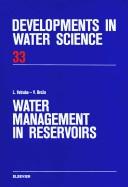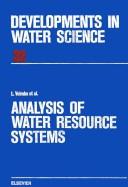| Listing 1 - 6 of 6 |
Sort by
|
Book
Year: 1967 Publisher: Bratislava : Czechoslovak dam commitec,
Abstract | Keywords | Export | Availability | Bookmark
 Loading...
Loading...Choose an application
- Reference Manager
- EndNote
- RefWorks (Direct export to RefWorks)

ISBN: 0444989331 9786611777364 1281777366 0080870244 9780444989338 9780080870243 9781281777362 Year: 1989 Publisher: Amsterdam ; New York : New York, N.Y. : Elsevier ; Distribution for the U.S.A. and Canada, Elsevier Science Pub. Co.,
Abstract | Keywords | Export | Availability | Bookmark
 Loading...
Loading...Choose an application
- Reference Manager
- EndNote
- RefWorks (Direct export to RefWorks)
This book introduces methods for solving the technical and economic problems posed by water reservoirs, so as to ensure they have the best possible economic and social effect. The significance of reservoirs and the development of their function in water management is assessed, and they are classified according to origin and placing. Among the methods for solving the reservoir's function, both graphical and numerical procedures are described, based on the probability theory and mathematical statistics. In the explanation of the supply function of the reservoirs, attention is paid to the processing of hydrological data, the respective probability distribution is assessed, the theory of stochastic processes is explained, and methods of modelling the sequence of mean annual and monthly discharges are mentioned. The demands of consumers and the reliability of water supply are analysed. All types of reservoir discharge control are presented, i.e. multi-year, annual, short-term and compensation. A solution is given for the discharge control in reservoir systems and in special cases of water management, as well as in individual reservoirs. To describe the flood control function of reservoirs, hydrological data are evaluated, the precision of the flood regime characteristics is assessed, the flood routing in a reservoir is resolved, and the question of flood control is discussed. Control of a reservoir is ensured by a special space, as well as by utilizing the supply and overflow components of the reservoir. A separate part is devoted to the water management operations of reservoirs, mentioning the rules for control of the discharge from reservoirs in permanent operation, mainly using central control, and for the study and evaluation of the water management function of reservoirs. The last part of the book describes solutions for new reservoir functions resulting from their incorporation into water management systems and their function in the environment. The basic types of water management systems are described, as well as conditions for their optimal operation. In a similar way, the distribution of investment and operation costs for the various parts of a complex water management project are discussed in detail, as well as the economic impact of the reliability of water supply and flood control. The physical, chemical, biological and social consequences of reservoirs and their significance in creating a cultural landscape are analysed. The book is mainly intended for those who are involved in the development, preparation and operation of water management schemes and students of graduate and post-graduate courses in the field of water management.
Reservoirs. --- Water-supply engineering. --- Groundwater. --- Hydrology. --- Aquatic sciences --- Earth sciences --- Hydrography --- Water --- Ground water --- Subterranean water --- Underground water --- Water, Underground --- Hydrogeology --- Engineering, Water-supply --- Civil engineering --- Engineering --- Hydraulic engineering --- Artificial lakes --- Lakes, Artificial --- Lakes, Man-made --- Man-made lakes --- Tanks (Reservoirs) --- Bodies of water --- Hydraulic structures --- Purification

ISBN: 9780444989444 0444989447 9780080870236 0080870236 1281777374 9781281777379 9786611777371 Year: 1988 Publisher: Amsterdam : Elsevier,
Abstract | Keywords | Export | Availability | Bookmark
 Loading...
Loading...Choose an application
- Reference Manager
- EndNote
- RefWorks (Direct export to RefWorks)
Water resource systems research provides a basis for rational water management in large basins. The design and operation of water resource systems are both the most complicated and the most important tasks of water management. This book deals with the basic issues involved in the application of systems sciences to water management. A survey of the systems sciences (the general systems theory, cybernetics, systems engineering, operations research and systems analysis) is presented, as well as the methods for water resource systems analysis and for water resource systems analysis and for their evaluation. The mathematical methods used in systems theory have been given detailed treatment. Linear and dynamic programming have been used as models of optimal programming. Since many practical tasks require the simulation models of water resource systems, apart from their principles and a detailed description, the simulation language for computing programming has been included. Other methods of operations research and their application to water resource systems have been analysed and evaluated. Some of these are: models of inventory theory, models of queuing theory, graphs, network analysis, and some special methods like the out-of-kilter algorithm, the chance-constrained model and the chance-constrained model combined with the simluation model. One chapter is devoted to information and information systems in water management. The final part of the book deals with prospects for water resource systems development. The book is intended for engineers and decision-makers involved in projects, operation and research. However, it can be used by students in high schools, technical universities and by graduate students. It will serve as an up-to-date source of information about the principles and methodology of water resource analysis and design.
System theory. --- Water-supply engineering --- Data processing.
Book
Year: 1964 Publisher: Prague : Czechoslovak national committee of large dams,
Abstract | Keywords | Export | Availability | Bookmark
 Loading...
Loading...Choose an application
- Reference Manager
- EndNote
- RefWorks (Direct export to RefWorks)
Concrete dams. --- Hydroelectric power generation --- Hydroelectric power generation

ISBN: 9780444989338 0444989331 9780080870243 0080870244 1281777366 9781281777362 Year: 1989 Publisher: New York, N.Y. Distribution for the U.S.A. and Canada, Elsevier Science Pub. Co
Abstract | Keywords | Export | Availability | Bookmark
 Loading...
Loading...Choose an application
- Reference Manager
- EndNote
- RefWorks (Direct export to RefWorks)
This book introduces methods for solving the technical and economic problems posed by water reservoirs, so as to ensure they have the best possible economic and social effect. The significance of reservoirs and the development of their function in water management is assessed, and they are classified according to origin and placing. Among the methods for solving the reservoir's function, both graphical and numerical procedures are described, based on the probability theory and mathematical statistics. In the explanation of the supply function of the reservoirs, attention is paid to the processing of hydrological data, the respective probability distribution is assessed, the theory of stochastic processes is explained, and methods of modelling the sequence of mean annual and monthly discharges are mentioned. The demands of consumers and the reliability of water supply are analysed. All types of reservoir discharge control are presented, i.e. multi-year, annual, short-term and compensation. A solution is given for the discharge control in reservoir systems and in special cases of water management, as well as in individual reservoirs. To describe the flood control function of reservoirs, hydrological data are evaluated, the precision of the flood regime characteristics is assessed, the flood routing in a reservoir is resolved, and the question of flood control is discussed. Control of a reservoir is ensured by a special space, as well as by utilizing the supply and overflow components of the reservoir. A separate part is devoted to the water management operations of reservoirs, mentioning the rules for control of the discharge from reservoirs in permanent operation, mainly using central control, and for the study and evaluation of the water management function of reservoirs. The last part of the book describes solutions for new reservoir functions resulting from their incorporation into water management systems and their function in the environment. The basic types of water management systems are described, as well as conditions for their optimal operation. In a similar way, the distribution of investment and operation costs for the various parts of a complex water management project are discussed in detail, as well as the economic impact of the reliability of water supply and flood control. The physical, chemical, biological and social consequences of reservoirs and their significance in creating a cultural landscape are analysed. The book is mainly intended for those who are involved in the development, preparation and operation of water management schemes and students of graduate and post-graduate courses in the field of water management.

ISBN: 0444989447 9786611777371 1281777374 0080870236 9780444989444 9780080870236 9781281777379 Year: 1988 Publisher: Amsterdam Elsevier
Abstract | Keywords | Export | Availability | Bookmark
 Loading...
Loading...Choose an application
- Reference Manager
- EndNote
- RefWorks (Direct export to RefWorks)
Water resource systems research provides a basis for rational water management in large basins. The design and operation of water resource systems are both the most complicated and the most important tasks of water management. This book deals with the basic issues involved in the application of systems sciences to water management. A survey of the systems sciences (the general systems theory, cybernetics, systems engineering, operations research and systems analysis) is presented, as well as the methods for water resource systems analysis and for water resource systems analysis and for their evaluation. The mathematical methods used in systems theory have been given detailed treatment. Linear and dynamic programming have been used as models of optimal programming. Since many practical tasks require the simulation models of water resource systems, apart from their principles and a detailed description, the simulation language for computing programming has been included. Other methods of operations research and their application to water resource systems have been analysed and evaluated. Some of these are: models of inventory theory, models of queuing theory, graphs, network analysis, and some special methods like the out-of-kilter algorithm, the chance-constrained model and the chance-constrained model combined with the simluation model. One chapter is devoted to information and information systems in water management. The final part of the book deals with prospects for water resource systems development. The book is intended for engineers and decision-makers involved in projects, operation and research. However, it can be used by students in high schools, technical universities and by graduate students. It will serve as an up-to-date source of information about the principles and methodology of water resource analysis and design.
System theory. --- Water-supply engineering --- Engineering, Water-supply --- Civil engineering --- Engineering --- Hydraulic engineering --- Water --- Systems, Theory of --- Systems science --- Science --- Data processing. --- Purification --- Philosophy
| Listing 1 - 6 of 6 |
Sort by
|

 Search
Search Feedback
Feedback About UniCat
About UniCat  Help
Help News
News